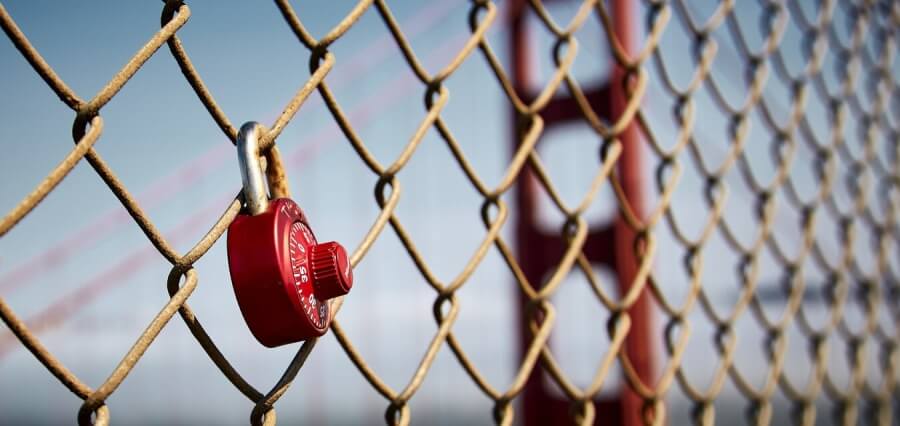Chain link fencing is a popular choice for both residential and commercial properties due to its durability, affordability, and versatility. This type of fencing is known for its distinctive diamond pattern created by interlocking steel wires.
In this blog post, we’ll delve into the various design and material options for chain link fencing, helping you make an informed decision for your fencing needs.
Introduction to Chain Link Fencing
Chain link fencing, also known as wire netting or wire-mesh fencing, is constructed from galvanized or coated steel wire that is woven into a mesh. It is widely used for securing property boundaries, protecting pets, and enclosing sports fields, playgrounds, and industrial areas. The key benefits of chain link fencing include:
Affordability: Typically less expensive than other types of fencing.
Durability: Resistant to weather and corrosion when properly treated.
Visibility: Provides a clear line of sight, which is ideal for security purposes.
Versatility: Available in various heights, gauges, and coatings to suit different needs.
Design Options for Chain Link Fencing
Standard Chain Link Fence
Basic Design: The standard chain link fence features a straightforward, no-frills design that is functional and cost-effective.
Applications: Commonly used for residential yards, school grounds, and commercial properties.
Decorative Chain Link Fence
Aesthetic Enhancements: Incorporates elements like colored coatings, privacy slats, or vinyl inserts to enhance visual appeal.
Customization: Can be tailored with different colors and materials to match the surrounding environment or to comply with homeowner association (HOA) regulations.
Security Chain Link Fence
High Security: Designed with added features such as barbed wire, razor wire, or anti-climb meshes to enhance security.
Applications: Ideal for military bases, prisons, and other high-security facilities.
Temporary Chain Link Fence
Portability: Built for easy installation and removal, making it suitable for temporary enclosures.
Applications: Commonly used at construction sites, events, and disaster relief areas.
Material Options for Chain Link Fencing
Galvanized Steel
Durability: Galvanized steel is coated with a layer of zinc to protect against rust and corrosion.
Cost: Generally more affordable than other materials.
Maintenance: Requires minimal maintenance and can last for many years.
Vinyl-Coated Chain Link
Aesthetics: Available in various colors, vinyl-coated chain link fencing blends well with different landscapes and provides a more attractive appearance.
Protection: The vinyl coating adds an extra layer of protection against the elements, enhancing the fence’s durability.
Maintenance: Easy to clean and maintain, the coating also prevents rusting.
Aluminum Chain Link
Lightweight: Aluminum is lighter than steel, making it easier to install and handle.
Corrosion Resistance: Naturally resistant to rust and corrosion, making it ideal for coastal areas.
Cost: Typically more expensive than galvanized steel but offers better longevity in harsh environments.
Stainless Steel Chain Link
Strength: Stainless steel provides superior strength and durability, suitable for high-stress applications.
Corrosion Resistance: Excellent resistance to corrosion, even in extreme weather conditions.
Cost: One of the more expensive options, but its longevity and minimal maintenance needs can offset the initial investment.
Gauge and Mesh Size Options
Wire Gauge
Definition: The gauge of a chain link fence refers to the thickness of the wire used in its construction. Lower gauge numbers indicate thicker wire.
Common Gauges: Standard residential fences typically use 11 or 12 gauge wire, while commercial or high-security fences might use 9 gauge or thicker.
Considerations: Thicker wire gauges offer greater strength and durability but may be more expensive.
Mesh Size
Definition: The mesh size refers to the size of the openings between the wires in the fence.
Common Sizes: Standard mesh sizes range from 1 inch to 2.5 inches. Smaller mesh sizes provide more security and are often used for high-security applications.
Considerations: Smaller mesh sizes can prevent animals from passing through and provide more privacy but may cost more.
Installation and Maintenance Tips
Installation
Professional vs. DIY: While some homeowners may choose to install their chain link fence themselves, professional installation ensures proper alignment, tension, and stability.
Preparation: Before installation, ensure you have the necessary permits and that you’ve marked property lines accurately. Clear the area of debris and vegetation.
Post Setting: Properly set and secure fence posts in concrete to ensure stability. The depth and spacing of the posts are crucial for the fence’s durability.
Tensioning: Ensure the mesh is properly tensioned to prevent sagging and maintain the fence’s integrity.
Maintenance
Regular Inspections: Periodically check for signs of damage, rust, or wear. Address any issues promptly to prevent further deterioration.
Cleaning: Clean the fence regularly to remove dirt, debris, and any potential buildup that could cause rust or damage.
Repairs: Replace damaged sections or rusted hardware as needed to maintain the fence’s appearance and functionality.
Coating Maintenance: For vinyl-coated fences, inspect the coating for any cracks or peeling and touch up as necessary to protect the underlying metal.
Pros and Cons of Chain Link Fencing
Pros
Affordability: One of the most cost-effective fencing options.
Durability: Long-lasting and resistant to many environmental factors when properly treated.
Visibility: Offers clear visibility, which can be beneficial for security.
Low Maintenance: Requires minimal upkeep compared to other fencing types.
Versatility: Suitable for a wide range of applications and customizable to fit different needs.
Cons
Aesthetic Limitations: While functional, chain link fences are often considered less attractive than other types of fencing.
Privacy: Provides minimal privacy unless enhanced with privacy slats or inserts.
Security Concerns: While it can be made more secure, a standard chain link fence can be climbed or cut more easily than some other types of fencing.
Conclusion
Chain link fencing is a practical and versatile choice for a variety of applications, offering a balance of durability, affordability, and ease of maintenance. By understanding the design and material options available, you can select the best chain link fence to meet your specific needs. Whether you prioritize aesthetics, security, or longevity, there is a chain link fencing solution that can enhance the functionality and appearance of your property.


